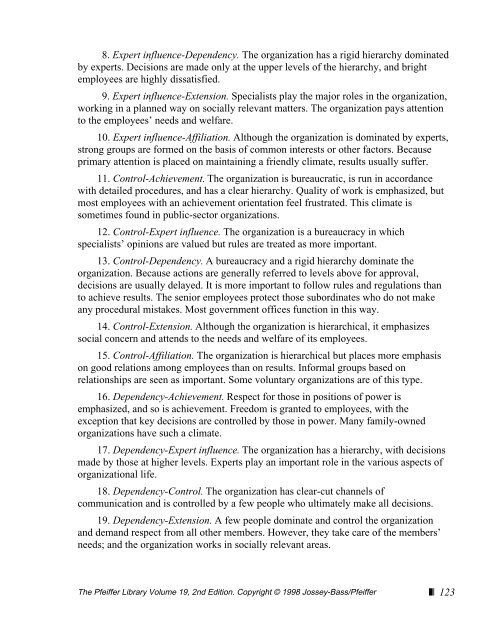motivational analysis of organizations
motivational analysis of organizations
motivational analysis of organizations
Create successful ePaper yourself
Turn your PDF publications into a flip-book with our unique Google optimized e-Paper software.
8. Expert influence-Dependency. The organization has a rigid hierarchy dominated<br />
by experts. Decisions are made only at the upper levels <strong>of</strong> the hierarchy, and bright<br />
employees are highly dissatisfied.<br />
9. Expert influence-Extension. Specialists play the major roles in the organization,<br />
working in a planned way on socially relevant matters. The organization pays attention<br />
to the employees’ needs and welfare.<br />
10. Expert influence-Affiliation. Although the organization is dominated by experts,<br />
strong groups are formed on the basis <strong>of</strong> common interests or other factors. Because<br />
primary attention is placed on maintaining a friendly climate, results usually suffer.<br />
11. Control-Achievement. The organization is bureaucratic, is run in accordance<br />
with detailed procedures, and has a clear hierarchy. Quality <strong>of</strong> work is emphasized, but<br />
most employees with an achievement orientation feel frustrated. This climate is<br />
sometimes found in public-sector <strong>organizations</strong>.<br />
12. Control-Expert influence. The organization is a bureaucracy in which<br />
specialists’ opinions are valued but rules are treated as more important.<br />
13. Control-Dependency. A bureaucracy and a rigid hierarchy dominate the<br />
organization. Because actions are generally referred to levels above for approval,<br />
decisions are usually delayed. It is more important to follow rules and regulations than<br />
to achieve results. The senior employees protect those subordinates who do not make<br />
any procedural mistakes. Most government <strong>of</strong>fices function in this way.<br />
14. Control-Extension. Although the organization is hierarchical, it emphasizes<br />
social concern and attends to the needs and welfare <strong>of</strong> its employees.<br />
15. Control-Affiliation. The organization is hierarchical but places more emphasis<br />
on good relations among employees than on results. Informal groups based on<br />
relationships are seen as important. Some voluntary <strong>organizations</strong> are <strong>of</strong> this type.<br />
16. Dependency-Achievement. Respect for those in positions <strong>of</strong> power is<br />
emphasized, and so is achievement. Freedom is granted to employees, with the<br />
exception that key decisions are controlled by those in power. Many family-owned<br />
<strong>organizations</strong> have such a climate.<br />
17. Dependency-Expert influence. The organization has a hierarchy, with decisions<br />
made by those at higher levels. Experts play an important role in the various aspects <strong>of</strong><br />
organizational life.<br />
18. Dependency-Control. The organization has clear-cut channels <strong>of</strong><br />
communication and is controlled by a few people who ultimately make all decisions.<br />
19. Dependency-Extension. A few people dominate and control the organization<br />
and demand respect from all other members. However, they take care <strong>of</strong> the members’<br />
needs; and the organization works in socially relevant areas.<br />
The Pfeiffer Library Volume 19, 2nd Edition. Copyright © 1998 Jossey-Bass/Pfeiffer ❚❘ 123

















